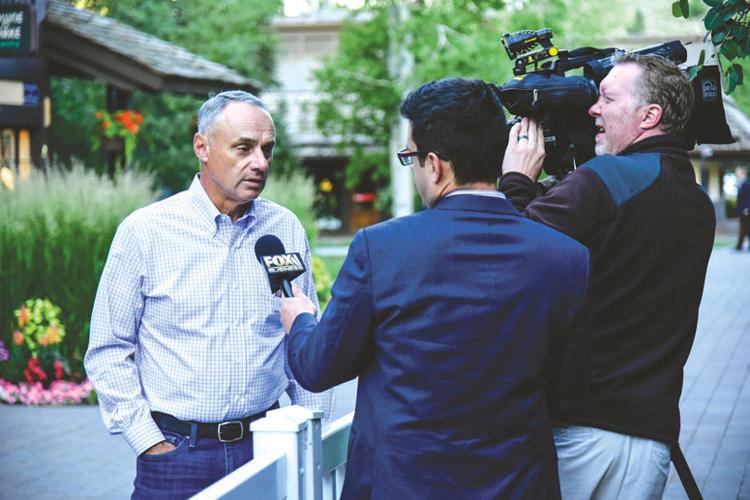Allen & Company Sun Valley Conference 2025

The annual Allen & Company Sun Valley Conference, a high-powered gathering of titans from the media, technology, and finance worlds, concluded last week amidst a backdrop of unprecedented industry upheaval. Whispers of mega-deals, strategic realignments, and existential anxieties permeated the Idaho air, leaving analysts to dissect the week's closed-door discussions and predict their ripple effects on the global landscape. The conference, infamous for its secrecy and influential attendees, served as a barometer for the shifting sands of power and innovation.
This year's Sun Valley meeting, held July 8-12, 2025, at the exclusive Sun Valley Resort, focused heavily on the impact of artificial intelligence (AI) on all sectors, the future of streaming services, and the increasingly complex regulatory environment facing tech giants. Attendance included CEOs from Meta, Apple, Amazon, Disney, Netflix, and a host of other major players, alongside venture capitalists, politicians, and influential thought leaders. The stakes were undeniably high, with discussions potentially shaping the future of entertainment, communication, and commerce for years to come.
AI Dominates Discussions
Artificial intelligence was undoubtedly the dominant topic of conversation at this year's conference. The rapid advancement of AI technologies, particularly generative AI, has created both immense opportunities and significant anxieties across industries. Discussions ranged from the ethical implications of AI development to its potential to revolutionize content creation, data analysis, and customer service.
One recurring theme was the need for responsible AI development and deployment. Concerns were raised about bias in AI algorithms, the potential for job displacement, and the spread of misinformation. Several attendees emphasized the importance of collaboration between industry, government, and academia to ensure that AI benefits society as a whole.
Microsoft CEO Satya Nadella reportedly delivered a compelling presentation on the transformative power of AI, highlighting Microsoft's investments in the field and its commitment to ethical AI practices. OpenAI's Sam Altman was also present, fielding questions about the future of generative AI and its potential impact on creative industries.
Streaming Services at a Crossroads
The future of streaming services was another major focus of the conference. The streaming landscape is becoming increasingly crowded and competitive, with companies battling for subscribers and struggling to maintain profitability. The conversation centered around strategies for attracting and retaining subscribers, the challenges of content licensing, and the potential for consolidation in the industry.
Several executives expressed concerns about the sustainability of the current streaming model. Rising content costs, coupled with increasing subscriber churn, are putting pressure on profit margins. Some suggested that the industry may need to explore new revenue streams, such as advertising or tiered subscription plans.
Disney CEO Bob Iger reportedly held numerous meetings with other media executives to discuss potential partnerships and collaborations. Speculation swirled around potential acquisitions or mergers, as companies look for ways to gain scale and compete more effectively against larger rivals like Netflix and Amazon Prime Video.
Regulatory Scrutiny Intensifies
The increasingly complex regulatory environment facing tech companies was also a key topic of discussion. Governments around the world are scrutinizing the power and influence of tech giants, with concerns about antitrust violations, data privacy, and online content moderation. Several panels addressed the need for companies to proactively engage with regulators and address concerns about their business practices.
The European Union's Digital Markets Act (DMA) and Digital Services Act (DSA) were frequently cited as examples of the growing regulatory pressures facing tech companies. These laws impose strict obligations on large online platforms, including requirements for interoperability, data portability, and content moderation. The potential for similar regulations to be adopted in other jurisdictions was also a major concern.
Meta CEO Mark Zuckerberg reportedly spent considerable time discussing the company's efforts to comply with the DMA and DSA, as well as its ongoing investments in data privacy and security. Other executives emphasized the importance of transparency and accountability in addressing regulatory concerns.
Dealmaking on the Horizon?
While the specifics of any potential deals remain shrouded in secrecy, rumors of potential mergers and acquisitions swirled throughout the conference. The rapidly changing media and technology landscape is creating both opportunities and pressures for companies to consolidate and gain scale.
One recurring rumor involved a potential acquisition of a smaller streaming service by a larger player. With several streaming services struggling to achieve profitability, analysts speculate that some may be ripe for acquisition by companies looking to expand their content library or subscriber base. Another potential deal involved a merger between two media companies looking to combine their assets and compete more effectively in the rapidly evolving entertainment landscape.
However, regulatory hurdles could potentially derail any major deal. Antitrust regulators are increasingly scrutinizing mergers and acquisitions in the technology and media sectors, raising concerns about potential monopolies and reduced competition.
"Sun Valley is always a place where deals get discussed, if not actually consummated," said media analyst Rich Greenfield of LightShed Partners. "The level of anxiety this year felt palpable, indicating a significant amount of change coming to these sectors."
Looking Ahead
The 2025 Allen & Company Sun Valley Conference served as a stark reminder of the challenges and opportunities facing the media, technology, and finance industries. The discussions surrounding AI, streaming services, and regulatory scrutiny highlighted the need for companies to adapt and innovate in order to thrive in a rapidly changing world.
The coming months are likely to see a flurry of activity as companies react to the trends and insights gleaned from the conference. New strategies, partnerships, and potential deals are all likely to emerge as the industry grapples with the forces shaping its future.
Ultimately, the success of these companies will depend on their ability to navigate the complex landscape of technological innovation, regulatory oversight, and evolving consumer preferences. The conversations initiated at Sun Valley will undoubtedly play a significant role in shaping that journey.


















